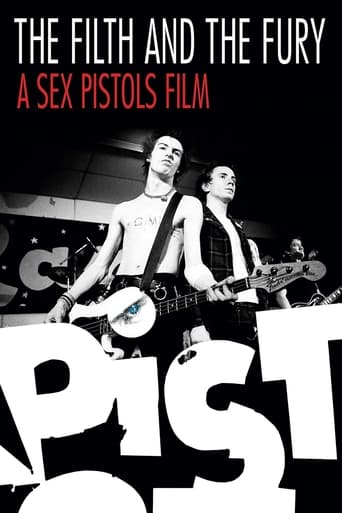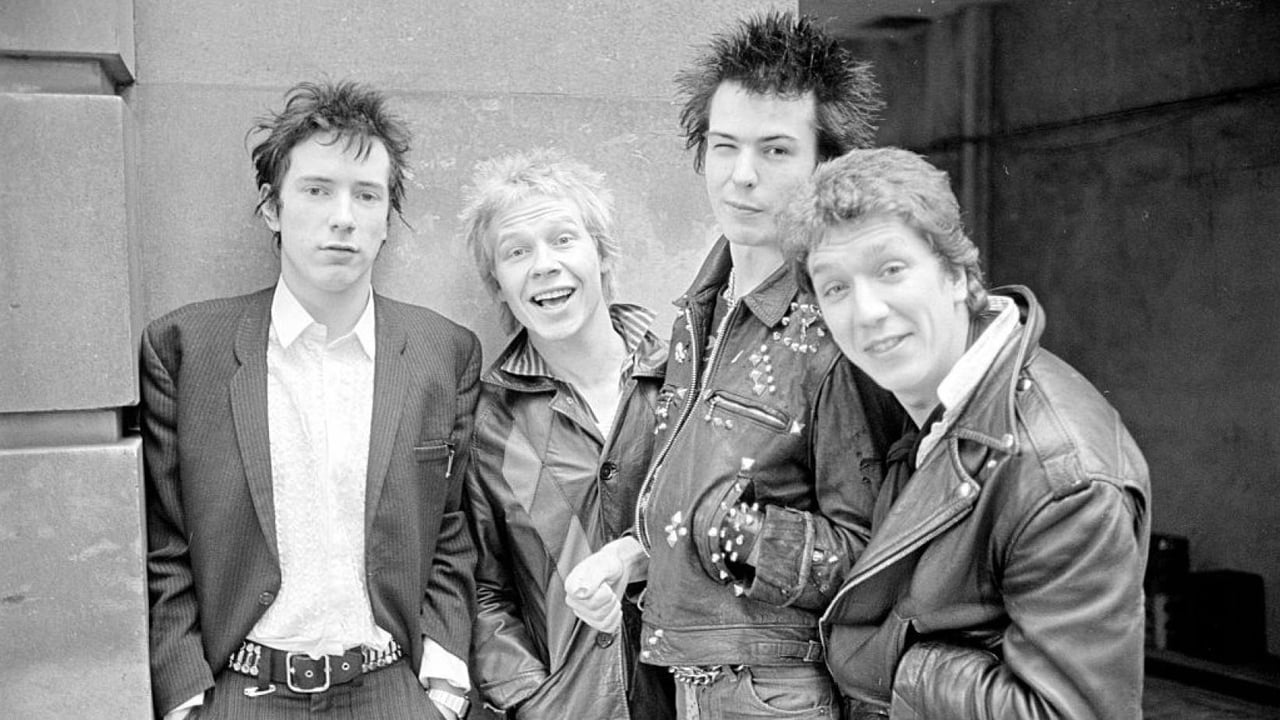Spikeopath
The Filth and the Fury is directed by Julien Temple and is a rockumentary charting the rise and fall of Punk Rock flag bearers, The Sex Pistols. 20 years earlier Temple had made The Great Rock and Roll Swindle, a bonkers and quirky movie that skewed the Sex Pistols legend as some elaborate hoax formulated by band manager Malcolm McLaren. The Filth and the Fury tells the story from the viewpoint of the band members themselves and goes some way to dispelling the myths that surround them and their self publicising manager. The title of the film is a reference to a headline that appeared in the British tabloid newspaper The Daily Mirror after an interview with the band on ITV's Today show presented by Bill Grundy. The story follows the band members from their humble beginnings in London's Shepherd's Bush, to their implosion at the Winterland Ballroom in San Francisco, and then to coup de grace as Sid Vicious & Nancy Spungen left the mortal coil.Love them or hate them, The Sex Pistols in the mid to late 70s created a wave in the music industry that can still be felt today. Most of it now seems tame of course, swearing on TV and alleged distasteful songs are common practice these days, but it were not the case back when flared trousers and guys wearing make up gave way to Punk Rock Britannia. But is there anything here for those who just don't get that the Pistols were influential and one of Britain's most important bands? Yes, definitely. This is no rose tinted glasses documentary serving only to keep the Pistols name on the high heat. Nor, is it over an hour and half of their videos and live footage. Of course the music features prominently, but it's in context to the story, a story that sees the remaining band members give frank and honest assessments of the time, the place and the now.Interviewing the band singularly in darkened silhouette to give off the impression we are witnessing criminal informers at work, Temple also puts the band into historical context with Britain's social situation in the 1970s. This is crucial to the origins of the band. It was a time of strikes and suspect politicians, so with archival footage from the period, Temple fuses the Pistols ire with that of a country that was limping along in apathy. Haters of the band don't want to agree of course, but the Pistols showed that not all of Britain would surrender meekly, and, that music could actually make a difference and shake up the system. "Get Off Your Arse" snarled John, and thousands did, as Punk bands formed over night and showed that the youth of the day had a voice. How many bands can say that eh?But as we know, it was to be a short lived journey for the band, one that would end in tragedy: as first the press went bazooka over the top with their every move, and then as one out of his depth bass player lost sight of the bands vision. This part of the film is subtly handled by Temple, the sense of impending doom hangs heavy, none more so with the old interviews held with Vicious that are woven into the last third as self destruction grows ever near. These sequences show what many people either forget or don't realise; that Vicious was just a kid of 21 years of age. This part of the tale also lets us into an untapped part of Lydon's {ne:Rotten} emotional side, a telling moment that brings the sorry chapter to a close.From a time when music could be as dangerous as the politicians running the country, The Filth & The Fury is an essential music based movie. Not just for fans of the band, nor just for curious music fans in general, but also for historians wishing to see just how bad late 1970s Britain was. 10/10
paul2001sw-1
The Sex Pistols were a band who combined a mixture of internal fury and energy with pantomime showmanship; but this combination generated such a reaction that it became a phenomenon that the group were no longer in control. Their manager (the recently deceased Malcolm McLaren, who gets no voice in this documentary) - allegedly - ran off with all the money (or was too incompetent to make it in the first place), the group self-destructed and so literally did bassist Sid Vicious, who possibly stabbed his girlfriend before dying of a heroin overdose himself. Julien Temple's film isn't bad at conveying what it must have been like to be a member of the band, although it doesn't explore why punk was so resonant - was it just a marketing trick (as McLaren proudly thought it was, much to lead singer Johnny Rotten's disgust) or did it really strike a cord in a profoundly disillusioned youth? There are no answers here, the documentary is really just a platform for Rotten and I don't understand why the interviews with him were all shot in the dark. But it's still interesting to remember a time when a few young men could induce moral panic through a little faux-yobbery. The truth is that with 30 years of distance, even the Sex Pistols seem quaint.
winner55
The real story of punk rock will, apparently, never be told. I suppose that's because most of the surviving participants have too much ego invested; or because, as the years fade, and the original social context disappears, the meaning of Punk - at its inception - becomes harder to decipher and easier to forget.I was in NYC in '76, when it was first breaking for the national press, and I hung around CBGBs under a number of pseudonyms, trying to write reviews and articles on bands that nobody ever heard of, many of them breaking up before I could dot the last "i" in the last paragraph. And I tried out a couple bands of my own, weird blends of Iggy and the Velvet Underground. But I was really an outsider (coming from upstate); and when the London scene started shipping singles over, I knew that, for whatever reason, my heart was really more into "Anarchy" and "White Riot" than the metal-surf-music of the Ramones or early Blondie. But this disjunction of 'right time wrong place' or whatever, allowed me to see the development of Punk in a way others seem content to ignore.The fundamental problem that Punk never resolved (and current neo-punks are still struggling with it), is, whether Punk was to be a continuance of the "counter culture" of the '60s in different guise, or just another pop-music for sexually frustrated young people. This sounds like an empty theoretical issue, but it has one all-important concrete aspect to it no one can ignore - money. Did (do) punks make music to make music - or to make money? That question was never answered; or, perhaps, every punk answered (answers) it in his/ her own way. Yet once we begin adding up all the individual answers, most of them sure come out sounding like "money". Yet the memory of Punk survives largely because it seemed to be about anything other than money; so the dilemma continues.That dilemma surfaces again in this film, especially in the discovery of the wretched rip-off Pistols manager Malcom McLaren pulled, not only on the audience, but on the Pistols themselves. The brief moments from the (thankfully unfinished) "Who Shot Bambi?" make it very clear that McLaren had not the slightest clue as to who the Pistols were, or what they represented. Yet he not only continued to guide their career after their break-up, but is warmly mentioned in Griel Marcus' scholarly history of Punk, "Lipstick Traces", which will probably bear influence on punk histories, long after the last "photo-album" paperback turns to dust. Yet it is clear that from the get-go McLaren's only interest was the profit.The Pistols were right, and are right, to ignore questions concerning their "materialism" or "selling out", since they were never part of the hippies' 'anti-materialism' ideal to begin with, and because they never denied a desire for some paycheck (which they almost never got from McLaren). But also plain is their desire to make the music of the UK working-class slums from whence they came.All of this comes to a head in the brief yet unforgettable tragedy of Sid Vicious - for whom music meant freedom, and money meant - heroin. But junky 'rockstars' don't play at commercial venues to make music. He ended up in NYC, which by then had a punk scene swarming with record-co.-exec vermin dealing dope and poseur sycophants trying to score. Eventually all that was left was the heroin, and it killed him.This film won't resolve any of these issues; but it may help raise them, and place them in a proper light. I can't agree that it is a well-made film - the editing, which is very flashy, is also somewhat vapid, and goes out of control too often. But there's adequate reminder of the era of the Pistols here, and why it was many of us thought, at the time (and still believe) that the Pistols were the most important rock band in history.The segment from the final performance at Winterland is worth the price of the film: same-old same-old music concerts are "no fun" and Jones and Rotten (knowing they've been betrayed by McLaren into performing for the corporate music world they hated) rub our noses in it until they've had enough and stalk off. If you can see this - and know what it's about - and still pay $200 to see Mick Jagger pull his wrinkled pud at you at the age of 65, you don't need a movie review, you need a psychiatrist.
Laurence Schwartz (lschwartz106)
Watching the first ten minutes of F & T F, I can honestly say that I experienced the only true religious experience I've ever felt in the matrix of a movie theatre. I had an out-of-body experience, so completely was a swept into the world of Julian Temple's interpretation of what The Sex Pistols were, how they came to be, when they came to be, and the madness of Great Britain that allowed them to come to be. It was probably the only time cheek irony ever really worked, that is, playing majestically classical music during the opening credits. And then that marvelous segue from the lower-income housing courtyard to Johnny's blistering presence. As ferociously brilliant a film as the band itself. But the film is more than just about the band; it's also about the fear of the establishment when its status quo is threatened, the media, and British society. The hypocrisy of the British government is ever evident when we see a public official denouncing the band as a disgusting bunch sub-human runts that are "the antithesis to human-kind" and then later see this and play a benefit concert and host an x-mas party for the children of striking firefighters. THAT WAS THE POINT OF THE PISTOLS in some respects. Their anger was grounded in the mistreatment of working people. Maybe it was a publicity booster, but I've seldom seen any American bands get their ands dirty and link up with Labor issues. The film is also about Language. It seems that using racial epithets are accepted in some British circles, but airing some traditional four letter words on public television, is still taboo. Anti-drug? Certainly. Johhny Rotten comes right out and extols the evils of Heroin and we see what it can do to a human being in Sid and his ultimate demise. SEE THIS MOVIE!


 AD
AD




